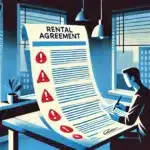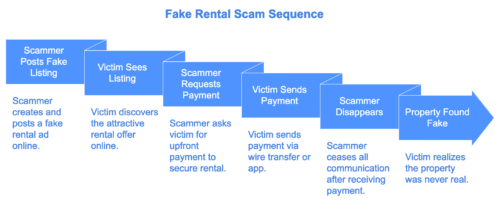
Red Flags in Rental Agreements
November 25, 2020
Rental Scams Across States: Does Location Matter?
February 26, 2021Scammers are constantly finding new ways to trick people, and Section 8 voucher holders are frequent targets. After an in-depth investigation across various locations and reports, we’ve identified the most common scams people encounter when trying to use their housing vouchers. These scams can cause people to lose money, personal information, and even their chance to use the voucher. Here’s a breakdown of the most frequent schemes we found.
1. Fake Landlord Listings
A very common scam involves fake rental listings. Scammers pretend to be landlords and post properties for rent that they don’t own. They use popular websites or social media to attract victims, offering properties at prices that seem like great deals.
How it works:
- The scammer asks for a deposit or application fee upfront to “hold” the rental.
- Often, they ask for the money through wire transfers or payment apps, which makes it difficult to track.
- Once you send the payment, the scammer disappears, and the property turns out to be fake.
How to avoid it:
- Always check the landlord’s identity and property ownership through local property records or your local housing authority.
- Never pay money upfront before seeing the property in person and confirming that everything is legitimate.

2. Application Fee Scams
Some scammers ask for fake application fees for properties that aren’t actually available. These scammers may pose as rental agents or landlords, asking for multiple fees like background check costs, security deposits, or “holding fees.”
Key signs:
- You’re asked to pay fees for multiple things, but you never get the property.
- The scammer may ask for payments through cash apps, gift cards, or wire transfers.
How to avoid it:
- Pay fees directly to trusted landlords or your local housing authority only.
- Be cautious if someone asks for payment before you’ve even seen the property or signed a rental agreement.
3. Fake Section 8 Waiting List Websites
Scammers create fake websites that pretend to be places where you can register for the Section 8 waiting list. These websites may look official, but they are designed to steal your personal information or charge you fees to “move up” on the list, which is impossible.
Key signs:
- The website asks for money to get on the waiting list.
- It asks for personal information like your Social Security number.
How to avoid it:
- There is no fee to register for Section 8. Always use your local housing authority’s official website, which should end in “.gov.”
- If you see any suspicious websites, report them to the Federal Trade Commission (FTC) or the U.S. Department of Housing and Urban Development (HUD). You can file a complaint at www.ftc.gov or www.hudoig.gov.
4. Landlords Overcharging Tenants
Some landlords try to make Section 8 tenants pay more than the amount approved by the housing authority. This is illegal and considered fraud. Landlords might ask for extra side payments that they don’t report to the housing authority.
How to avoid it:
- Confirm the exact amount of rent with both your housing authority and the landlord.
- Report any extra payment requests to your local housing authority immediately.

5. Imposter Government Officials
Some scammers pretend to be from HUD or your local housing authority. They may call, email, or even show up in person asking for personal information or payment to “renew” your voucher or process paperwork.
How to avoid it:
- HUD and housing authorities will never ask for your personal information or payment over the phone or email. If you get a suspicious call or email, hang up or delete it, and contact your housing authority directly using official contact information. Report any suspicious behavior to HUD through their hotline at 1-800-347-3735.
6. Identity Theft Scams
Scammers can steal personal information, like your Social Security number or bank details, to commit identity theft. They can use this information to apply for benefits in your name or even steal your housing voucher.
How to avoid it:
- Protect your personal details and don’t share your Social Security number, voucher details, or banking information unless you are sure the person asking is legitimate.
- Monitor your credit reports regularly to catch any suspicious activity early.

7. Fraudulent “Help” Services
Some scammers offer fake services that claim to help you with the Section 8 process, charging fees to “speed up” your application or promising to find housing for you quickly. They take your money and disappear without providing any help.
How to avoid it:
- Be cautious of anyone asking for fees to help you with Section 8. Your housing authority will provide legitimate help at no cost.
Protect Yourself from Scams
Here are a few key steps you can take to protect yourself from Section 8 scams:
- Report suspicious activity: Contact HUD’s Office of Inspector General at 1-800-347-3735 or file a report online.
- Use official websites: Always apply for Section 8 or get information through official housing authority websites or websites checked by Section 8 Shield.
- Be cautious online: Double-check any listings you find online and avoid paying upfront fees unless you’ve verified everything with your housing authority.
By staying alert and following these steps, you can protect yourself from becoming a victim of these common scams. If something seems off, trust your instincts and double-check with your local housing authority.




